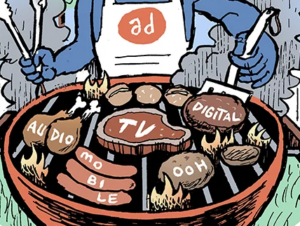“On TV And Video” is a column exploring opportunities and challenges in advanced TV and video.
Today’s column is written by John Hamilton, CEO and founder of TVDataNow.
As 2020 drew to a close, Roku was one of the few companies that emerged stronger than it entered.
Reporting on its Q3 earnings, Roku announced total net revenue grew 73% YoY to $452 million and active accounts grew 43% YoY to 46 million.
Not bad for a company that began as a skunkworks project at Netflix that would allow users to stream movies to their TVs. At the last minute, Netflix CEO Reed Hastings killed the project, worried that owning a box would cut off Netflix access to emerging third-party streaming players.
This decision likely was the best move for both Netflix and the newly spun-off Roku. It has cycled through many generations of its Roku player and still offers hardware players in the marketplace crowded with Apple TVs, Amazon Fires, Google Chromecasts, and others. But Roku’s future may more so depend on becoming the de facto operating system for Smart TVs. As more people upgrade their existing TVs to smart TVs with access to apps pre-installed in the smart TV OS, they will be less inclined to spend money on an external player.
According to Kantar Media, Roku is the number one TV streaming platform based on hours streamed. It took some time to ramp up its ad operations, which is why it’s currently a minnow for CTV dollars (9.1% of the market). But eMarketer predicts it will cut into Hulu’s ad share. The research firm projects Roku will command 11% of the market by 2022, while Hulu will decrease from 24.2% to 22%.
However, it’s a competitive space. Many brands currently sell TVs with Roku OS installed, including TCL, Hitachi, Insignia, and others. But some of the higher-end manufacturers use competitive software, such as Samsung and LG that prioritize proprietary OSs, or those by Google, Amazon Fire, Yahoo, and others.
Roku is primed to dominate attention for CTV ad dollars for four significant reasons.
Predicted growth
When every non-Macintosh/Apple computer came preinstalled with Windows, it turned Microsoft into a powerhouse (and near-monopoly) seemingly overnight.
Since Roku is a recognizable name, upstart TV brands will continue to use Roku’s OS to power their budget TVs. If Roku continues to improve its user interface, continues to innovate on the content front, and establish a dominant position, it could conceivably graduate to an option for higher-end TVs. Roku has put resources into its building up the content offerings in its Roku Channel and recently acquired the Quibi library, demonstrating that innovations in the software is not the only way it plans to compete.
And while it does not guarantee Roku success, the fact that their entire business depends on CTV, versus Apple, Google, and Amazon – where CTVs-related revenues are a mere drop in a bucket, means the stakes are higher for them to get it right.
Access to the long-tail
Roku stands to benefit from the democratization of CTV publishers. Whereas any publisher can create a CTV app for viewing on Roku, Apple TV, for one, must approve every single app.
In recent times, the only major publisher not found on Roku has been HBO Max, but they resolved their differences in late 2020. For the foreseeable future, Roku will have the most publishers in its ecosystem, therefore having more access to the mid-to long-tail of app publishers than the competition. Roku provides simple, one-stop access to a portion of those app publisher’s traffic (5-30%).
Closed system
Roku can provide application publisher-level reporting and measurement, which serves as table stakes for sophisticated, performance-oriented marketers. Roku has a big decision to make whether to open up the measurement to many different partners or close its system to its own metrics. Doing the latter will severely inhibit growth as advertisers prioritize platforms that allow them more measurement opportunities.
The mobile apocalypse
Performance of digital (and particularly mobile) campaigns will go down in the future because of changes in privacy and the big tech ecosystem.
If the digital space becomes less appealing to advertisers, it is likely that they will actively seek in CTV an experience like traditional digital. Roku’s recent acquisition of Nielsen’s video ad business demonstrates how dedicated it is to attracting performance-based marketers.
Expansive future?
The CTV platform space will continue to court cutthroat competition. And while high-end TVs likely will build out their own software solutions or partner with Google, Roku is well positioned to be the OS for the longtail of providers. That means a huge audience for eyeballs that it has only begun to monetize properly.
Follow TVDataNow (@tvdatanow) and AdExchanger (@adexchanger) on Twitter.













